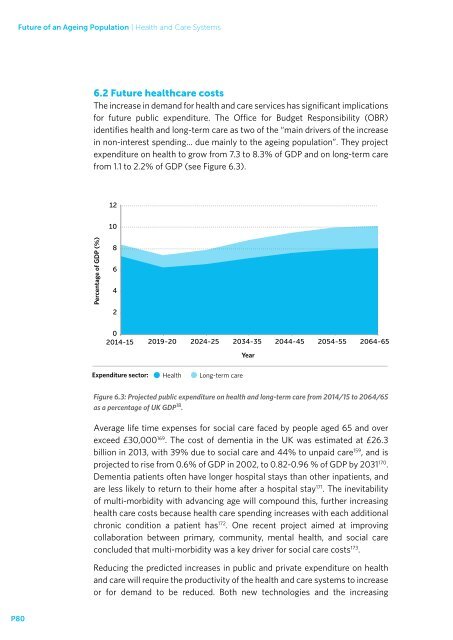Future of an Ageing Population
gs-16-10-future-of-an-ageing-population
gs-16-10-future-of-an-ageing-population
You also want an ePaper? Increase the reach of your titles
YUMPU automatically turns print PDFs into web optimized ePapers that Google loves.
<strong>Future</strong> <strong>of</strong> <strong>an</strong> <strong>Ageing</strong> <strong>Population</strong> | Health <strong>an</strong>d Care Systems<br />
6.2 <strong>Future</strong> healthcare costs<br />
The increase in dem<strong>an</strong>d for health <strong>an</strong>d care services has signific<strong>an</strong>t implications<br />
for future public expenditure. The Office for Budget Responsibility (OBR)<br />
identifies health <strong>an</strong>d long-term care as two <strong>of</strong> the “main drivers <strong>of</strong> the increase<br />
in non-interest spending… due mainly to the ageing population”. They project<br />
expenditure on health to grow from 7.3 to 8.3% <strong>of</strong> GDP <strong>an</strong>d on long-term care<br />
from 1.1 to 2.2% <strong>of</strong> GDP (see Figure 6.3).<br />
12<br />
10<br />
Percentage <strong>of</strong> GDP (%)<br />
8<br />
6<br />
4<br />
2<br />
0<br />
2014-15 2019-20 2024-25 2034-35 2044-45 2054-55 2064-65<br />
Year<br />
Expenditure sector:<br />
Health<br />
Long-term care<br />
Figure 6.3: Projected public expenditure on health <strong>an</strong>d long-term care from 2014/15 to 2064/65<br />
as a percentage <strong>of</strong> UK GDP 18 .<br />
Average life time expenses for social care faced by people aged 65 <strong>an</strong>d over<br />
exceed £30,000 169 . The cost <strong>of</strong> dementia in the UK was estimated at £26.3<br />
billion in 2013, with 39% due to social care <strong>an</strong>d 44% to unpaid care 159 , <strong>an</strong>d is<br />
projected to rise from 0.6% <strong>of</strong> GDP in 2002, to 0.82-0.96 % <strong>of</strong> GDP by 2031 170 .<br />
Dementia patients <strong>of</strong>ten have longer hospital stays th<strong>an</strong> other inpatients, <strong>an</strong>d<br />
are less likely to return to their home after a hospital stay 171 . The inevitability<br />
<strong>of</strong> multi-morbidity with adv<strong>an</strong>cing age will compound this, further increasing<br />
health care costs because health care spending increases with each additional<br />
chronic condition a patient has 172 . One recent project aimed at improving<br />
collaboration between primary, community, mental health, <strong>an</strong>d social care<br />
concluded that multi-morbidity was a key driver for social care costs 173 .<br />
Reducing the predicted increases in public <strong>an</strong>d private expenditure on health<br />
<strong>an</strong>d care will require the productivity <strong>of</strong> the health <strong>an</strong>d care systems to increase<br />
or for dem<strong>an</strong>d to be reduced. Both new technologies <strong>an</strong>d the increasing<br />
P80


